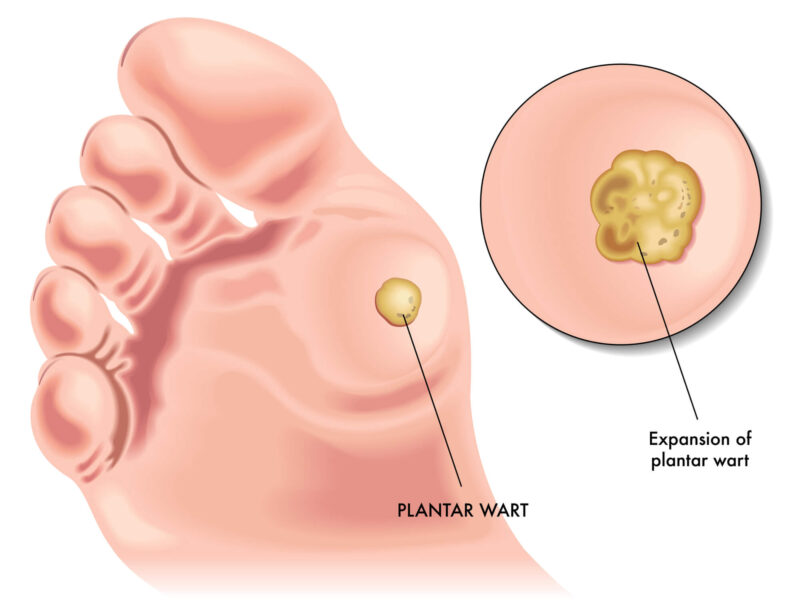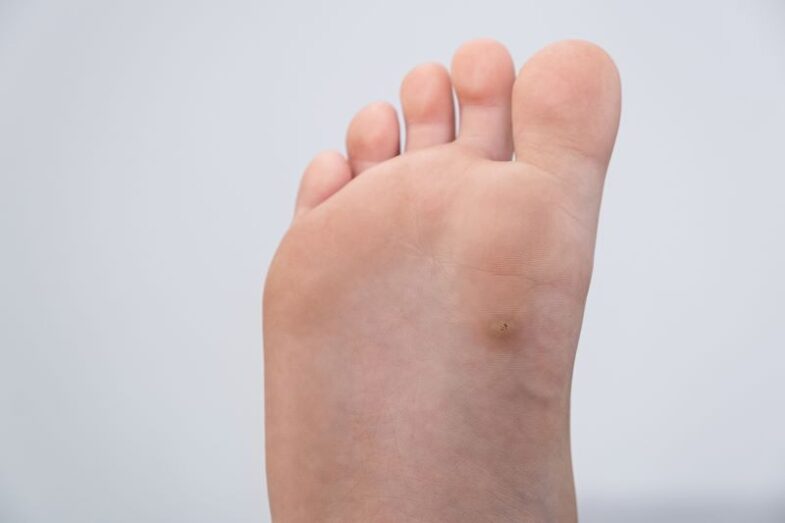Warts can be incredibly pesky. Not only are they annoying to deal with and pretty unsightly, but sometimes they can actually cause you pain. Whether this is your first wart or you have recurring warts, you probably want to get rid of yours as soon as possible, such as with a wart removal in Algonquin. Warts on your feet, also known as plantar warts, can be especially bothersome. Plantar warts grow on the soles of your feet and can sometimes impede your ability to walk and exercise comfortably. Luckily, warts aren’t an indicator of bad health. In most cases, warts develop on perfectly healthy individuals. In this article, we’ll tell you all you need to know about warts, including how to identify a wart, how to get rid of warts, and the answer to “Can warts come back after surgery?” You’re probably looking forward to getting rid of your wart, so read along to learn the causes and treatments.
 What Is a Wart?
What Is a Wart?
While we generally understand what a wart is, there are actually a lot of things we don’t know about them. When considering how to identify a wart, we know warts are growths that can appear on the surface of your skin. Human papillomavirus, also known as HPV, infects the skin and causes the skin cells to grow faster than usual. Now, you might be concerned about HPV but we actually come into contact with this virus incredibly often. Additionally, the strain of HPV that causes warts is harmless. It’s not certain exactly how people pick up the virus that causes warts. This is because the infection occurs in the upper skin layers. This means that the virus could have been picked up at any time, anywhere. In some cases, a virus could be in the skin for years before turning into a wart.
Since we don’t know exactly why warts appear in the first place, there’s no set cure. But the good news is that warts typically go away on their own in one to two years. If you’re anxious to learn how to get rid of warts, there are also several treatment options that can help. Read along to learn more about how to get rid of your warts.
How to Identify a Wart
If you haven’t already had one, you might be wondering whether you have a wart at all. Sometimes people can confuse different types of growths with warts. A wart might look different depending on the type you have. There are three different types of warts:
Common Warts
These types of warts can be found anywhere on the body. They will look like a raised, rough surface on the skin. The color of common warts can vary from a lighter color to a gray-brown color.
Plantar Warts
Plantar warts are only found on the soles of your feet. These warts can sometimes develop in clusters which are called mosaic warts. They are typically rough and spongy and pressed flat from walking. The color can vary from gray to brown.
Flat Warts
As the name suggests, this type of wart appears flat. Sometimes they can be slightly raised. These are generally smaller than other warts and appear smooth and pink.
Looking at pictures of each type can help you identify a wart. However, if you are not able to identify it, it might be wise to see a medical professional. This is especially true if the growth on your skin hurts or causes discomfort.
 How to Get Rid of Warts
How to Get Rid of Warts
There are plenty of treatment options for all types of warts. Unfortunately, there is no one treatment option that can completely ensure your wart will go away. Usually, time is the only guaranteed method of getting rid of a wart. However, most people will want a wart gone long before time takes care of it. In this case, here are some of your treatment options:
Salicylic Acid
This should probably be the first treatment option you pursue. This is because you can get salicylic acid over the counter at a decent price. It is the only topical application that actually exceeds in performance compared to a placebo. It comes in liquid, gel, and patch forms.
Vitamins
Yes, there are vitamins that help decrease the chances of getting a wart. This can work for people who are fans of natural remedies but don’t want to wait a long time. It can also work for people wanting to save money on a trip to the doctor. Several studies have shown Zinc to be an effective vitamin for improving the state of and clearing warts. You can choose to start consuming Zinc-rich foods. Or you can purchase Zinc supplements over the counter.
Cryotherapy
Cryotherapy involves freezing the wart. A doctor will spray liquid nitrogen onto the wart which will burn the wart and some of the skin that surrounds it. Depending on the severity of the wart, you might have to freeze the wart several times. This means you should expect to go see your doctor several times over the span of a few weeks.
If these kinds of treatments don’t work to get rid of the wart, your doctor might opt for surgery. Usually, the surgery is low risk and only requires a local anesthetic. So, you might be wondering, “Can warts come back after surgery?” Yes, they can. If your immune system does not eliminate the infection, a wart can come back.
 Wart Removal in Algonquin, IL
Wart Removal in Algonquin, IL
If you have a plantar wart you need treated, Foot and Ankle Specialists of Illinois are here for you. While keeping your feet healthy might not seem like a generally high priority at times, your quality of life can decrease drastically if something happens to them. Feet can be a key to your overall health. For wart removal in Algonquin, Huntley, Carpentersville, and surrounding areas of Illinois, book an appointment with us today.

